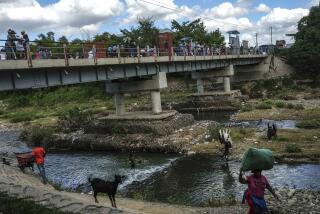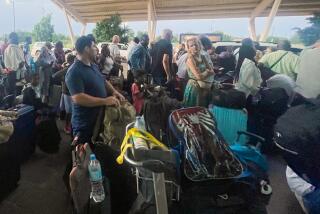Zaire Reopens Its Border to Refugees--and Problems : Africa: The reversal aims to defuse confrontation at a frontier bridge. French troops withdraw as scheduled.
- Share via
CYANGUGU, Rwanda — Zairian paratroopers enforced a border blockade against fleeing Rwandans on Sunday by firing gunshots over the heads of thousands--but they later relented and opened a back door for refugees to escape.
In so doing, Zaire traded one crisis for another. By striving to defuse an explosive confrontation at the Rusizi River bridge, the nation seemed to accept its grim fate as the new home for tens of thousands more refugees.
For a country without a working telephone system, without mail delivery, with barely passable roads and unreliable services, absorbing more legions of sick and weak refugees is no small matter.
At daybreak, perhaps 20,000 refugees were massed on the Rwandan bank of the swift, blue Rusizi, frustrated that their escape route into Zaire was blocked. Some angry young men forced their way to the front of the pack and twice attempted to storm across the bridge, throwing rocks and swinging machetes.
Both times Zairian soldiers fired rifles into the air and drove the refugees back.
U.N. and relief agency officials said they could confirm no serious injuries. But those at the scene agreed the situation was extremely volatile as refugees grew fearful with the knowledge that the protection of French troops was ending Sunday.
After several hours of negotiations with U.N. refugee agency officials, Zaire announced that it would reopen a second bridge five miles downstream from the main border crossing and allow refugees to enter.
The primary bridge remained closed to prevent a stampede, and U.N. officials agreed to help transport refugees directly to camps so they would not further besiege the Zairian border city of Bukavu.
“These are desperate people feeling trapped,” said U.N. refugee agency spokesperson Kris Janowski. “We think the border should stay open, and Zaire agreed to defuse the situation.”
France had maintained a “safe zone” in the southwestern corner of Rwanda since late June but pulled out Sunday as promised, turning over security to African troops under the flag of the United Nations.
Some refugees and relief officials feared the new troops, who lack any mandate to use force, would not be able to maintain the “safe zone.”
As predicted, the refugees showed little respect for the U.N. soldiers, cursing them and surrounding their border compound on the Rwandan side of the river.
The Ethiopian troops at the Rusizi bridge made little effort to control the crowd.
“Essentially, they’re saying they are powerless,” Janowski said.
Despite the border flare-up, the French turned away from Rwanda without a pause; a convoy of Foreign Legion troops drove off even as gunfire crackled in the air Sunday.
Zaire closed the Rusizi bridge at 2 p.m. Saturday after absorbing tens of thousands of Rwandan refugees in the last few days. These were in addition to about 1 million who earlier crossed to the Zairian town of Goma, 70 miles to the north. Government authorities said they hoped to avoid the ruination of Bukavu, a densely populated city and farm region with little open space for such huge numbers of refugees.
But dozens--perhaps hundreds--of refugees skirted the bridge closure by swimming across the river, hiring fishing vessels and paddling crude rafts made of lashed bamboo.
The scale of the crisis makes any head count of refugees a wild guess at best. But relief officials roughly estimate that 80,000 to 100,000 refugees have jammed into Bukavu, 56,000 are massed in nearby refugee camps and tens of thousands more have moved along elsewhere.
In addition to the 20,000 people massed at the Rwandan side of the Rusizi River bridge, there are perhaps 1 million within walking distance of the border, according to estimates.
Rwanda’s troubles are the result of a blood feud generations old between ethnic Hutus and Tutsis. In the latest outbreak, up to 500,000 people were slaughtered, mostly Tutsi civilians.
Routed by a Tutsi rebel army in July, the former Hutu-dominated government fled, triggering the massive migration of Hutu citizens. They now huddle here at the border and in squalid Zairian refugee camps, fearing the new Tutsi army will move in behind the French and attack them or arrest them for war crimes.
More to Read
Sign up for Essential California
The most important California stories and recommendations in your inbox every morning.
You may occasionally receive promotional content from the Los Angeles Times.













